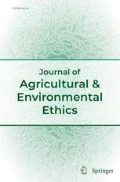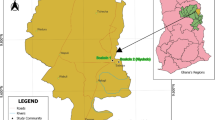Abstract
Stakeholder engagement is a crucial concept of extension education. Engagement expresses democratic values of the land-grant mission by providing opportunities for stakeholders to influence program planning, including setting the agenda and negotiating resource allocations. In practice, the concept of engagement guides the formation of partnerships among extension, communities, industry, and government. In the area of sustainable agriculture, however, stakeholders may conflict, presenting challenges to the engagement process. Results from a study of a Canadian sustainable agriculture program, produced using cultural anthropology and participatory action research, detail challenges of the engagement process that led to reconstruction of a farmer-extension partnership. Notable in the early phase of the reconstruction process were critical reflection, stakeholder forums, exclusion through caucusing, and coalition building. An argument for a neopragmatist view provides a theoretical basis for understanding counterintuitive dimensions of engagement revealed by the study.
Similar content being viewed by others
Abbreviations
- NDP:
-
New Democratic Party
- NGOs:
-
nongovernmental organizations
- PAR:
-
participatory action research
- PIE:
-
public issues education
References
Allen, W. and M. Kilvington, “Why Involving People Is Important: The Forgotten Part of Environmental Information System Management,” Second International Conference on Multiple Objective Decision Support Systems for Land, Water, and Environmental Management (Brisbane, Australia, 1999).
Bawden, R.,Systemic Development: A Learning Approach to Change (University of Western Sydney, Hawkesbury, Australia, 1995), Occasional Paper #1.
Blackburn, D. J. (ed.),Extension Handbook: Processes and Practices (University of Guelph, Guelph, ON, 1994).
Brookfield, S. D.,Developing Critical Thinkers: Challenging Adults to Explore Alternative Ways of Thinking and Acting (Jossey-Bass, San Francisco, 1987).
Campbell, J.,The Community Reconstructs: The Meaning of Pragmatic Social Thought (University of Illinois Press, Urbana, IL, 1992).
Carr, A., “Innovation of Diffusion: Landcare and Information Exchange,”Rural Society 5(2) (1995), 56–71.
Cervero, R. M. and A. L. Wilson,Planning Responsibly for Adult Education: A Guide to Negotiating Power and Interests (Jossey-Bass, San Francisco, 1994).
Chambers, R.,Whose Reality Counts? Putting the First Last (ITG, London, 1997).
Dewey, J.,Logic: The Theory of Inquiry. (Henry Holt, New York, 1938).
Erickson, F., “Qualitative Methods,” in R. L. Linn and F. Erickson (eds.),Quantitative Methods and Qualitative Methods (MacMillan, New York, 1990), pp. 75–194.
Ervin, D. E. and K. R. Smith,What It Takes to ‘Get to Yes’ for Whole Farm Planning Policy (Wallace Institute for Alternative Agriculture: Policy Studies Report No. 5, Greenbelt MD, 1996).
Fagen, J., B. Kennedy, and B. Van den Broek,Proceedings of the Farm Planning Workshop (Ontario Ministry of Agriculture and Food, Guelph, ON, 1992).
Geertz, C., “Thick Description: Toward an Interpretive Theory of Culture,” in C. Geertz (ed.),The Interpretation of Cultures: Selected Essays (Basic Books, 1973). pp. 3–30.
Gillespie, G. W., Jr. “Sustainable Agriculture and Prospects for Rural Community Development in the United States,”Research in Rural Sociology and Development (6) (1995), 167–191.
Greenwood, D. J. and M. Levin,An Introduction to Action Research (Sage, Thousand Oaks, CA, 1998).
Grudens-Schuck, N.,When Farmers Design Curriculum: Participatory Education for Sustainable Agriculture in Ontario, Canada (Ph.D. dissertation, Cornell University, 1998).
Grudens-Schuk, N.,Extension and Grassroots Educators’ Approaches to Participatory Education: Interrelationships Among Training, Worldview, and Institutional support. Paper presented at the Adult Education Research Conference (Vancouver, British Columbia, June 1–4, 2000).
Grudens-Schuck, N. and Hill, D., “Democratic Action and Participatory Research in an Environmental Education Program for Farmers in Canada: Farmers’ Local Knowledge.” Paper presented at the World Congresses 4/8 Convergence (Cartagena, Colombia (S.A), June 1–5, 1997).
Guba, E. G. and Y. S. Lincoln,Fourth Generation Evaluation (Sage, Newbury Park, CA, 1989).
Gutmann, A. and D. Thompson,Democracy and Disagreement (Harvard University Press, Cambridge, MA, 1996).
Hassanein, N., and J. R. Kloppenburg, “Where the Grass Grows Again: Knowledge Exchange in the Sustainable Agriculture Movement,”Rural Sociology 60(4) (1995), 721–740.
Heron, J.,Cooperative Inquiry: Research into the Human Condition (Sage, London 1996).
Higgins, E.,Whole Farm Planning: A Survey of North American Experiments. Greenbelt, MD: Wallace Institute for Alternative Agriculture, Policy Studies Report No. 9, 1998.
Hinchcliffe, F., I. Guijt, J. N. Pretty, and S. Parmesh,New Horizons: The Economic, Social, and Environmental Impacts of Participatory Watershed Development (IIED, Gatekeeper Series No. 50, London, 1995).
Hirschman, A. O.,Shifting Involvements: Private Interests and Public Action (Princeton University Press, Princeton, 1982).
Knapp, M.,Watershed-Based Management of Nonpoint Source Pollution in Alabama: An Institutional Analysis and Comparison (Ph.D. dissertation. Auburn University, 1994).
Korten, D. C.,Getting to the 21st Century: Voluntary Action and the Global Agenda (Kumarian Press, West Hartford, CT, 1990).
Levin, M. and D. J. Greenwood, “The Reconstruction of Universities: Seeking a Different Integration into Knowledge Development Processes,”Concepts and Transformations 2(4) (1997), 145–163.
Light, A. and E. Katz (eds.),Environmental Pragmatism (Routledge, London, 1996).
Lockeretz, W., “What Have We Learned About Who Conserves Soil?”Journal of Soil and Water Conservation 45(5) (1990), 517–523.
Lockie, S. and F. Vanclay (eds.),Critical Landcare (Charles Sturt University, Centre for Social Research: Key Papers Series No. 5, Wagga Wagga, NSW, 1997).
MacKenzie, S. H.,Integrated Resource Planning and Management: The Ecosystem Approach in the Great Lakes Basin (Island Press, Washington, DC, 1996).
Middendorf, G. and L. Busch, “Inquiry for the Public Good: Democratic Participation in Agricultural Research,”Agriculture and Human Values 14(1) (1997), 45–57.
Mustian, R. D., R. T. Liles, and J. M. Pettitt, “The Extension Education Process” (Module 2), in E. J. Boone (ed.),Working with Our Publics: In-service Education for Cooperative Extension (North Carolina Agricultural Extension Service, Raleigh, NC, 1988).
National Association of State Universities and Land-Grant Colleges {NASULGC},Returning to Our Roots: The Engaged Institution (Author, Washington, DC, 1999).
Ontario Farm Environmental Coalition (OFEC),Our Farm Environmental Agenda (Rev. ed) (University of Guelph, Guelph, ON, 1991/1995).
Pelletier, D., D. Kay, M. Schlarb, and T. Robertson, “Public Issues Education: Avoidance, Neutrality, and the Expert Model,”Adult Learning (1999), 14–16.
Peters, S. J.,Renewing the Land-Grant Idea for the 21st Century. Keynote Address University of California Statewide Conference, Sacramento, CA, 1999.
Röling, N. G., “Agricultural Knowledge and Information Systems,” in D. J. Blackburn (ed.),Extension Handbook: Processes and Practices (University of Guelph, Guelph, ON, 1994), pp. 57–67.
Rorty, R.,Consequences of Pragmatism (University of Minnesota Press, Minneapolis, MN, 1982).
Sanderson, D. R., “Understanding Cooperative Extension: Our Origins, Our Opportunities” (Module 1), in E. J. Boone (ed.),Working with Our Publics: In-Service Education for Cooperative Extension (North Carolina Agricultural Extension Service, Raleigh, NC, 1988).
Schön, D. A.,The Reflective Practitioner: How Professionals Think in Action (Basic Books, 1983).
Sclove, R. E.,Democracy and Technology (Guilford Press, New York, 1995).
Singh, N. and V. Titi (eds.),Empowerment: Towards Sustainable Development (Fernwood Publishing, Winnepeg, Manitoba, 1995).
Taylor-Powell, E., B. Rossing, and J. Geran,Evaluating Collaboratives: Reaching the Potential (University of Wisconsin-Extension, Madison, WI, 1998).
Uphoff, N., “Institutionalizing User Participation in a System of Linkage Among Research, Extension, and Farmers.” Paper presented for workshop on Extension Dynamics and Future Roles. Bagor, Indonesia, 1995.
Van den Broek, B.,The History of Farm Plans in Ontario (Ontario Ministry of Agriculture and Food, Resources Management Branch, Guelph, ON, 1992).
Wells, B. L., “Working with Groups and Organizations” (Module 5), in E. J. Boone (ed.),Working with our Publics: In-Service Education for Cooperative Extension (North Carolina Agricultural Extension Service, Raleigh, NC, 1988).
Welton, M. R. (ed.),In Defense of the Lifeworld: Critical Perspectives on Adult Learning (SUNY Press, Albany, NY, 1995).
Western, D., M. R. Wright, and S. C. Strum (eds.),Natural Connections: Perspectives in Community-Based Conservation (Island Press, Washington, DC, 1994).
Woodhill, J. and N. G. Röling, “The Second Wing of the Eagle: The Human Dimension in Learning our Way to More Sustainable Futures,” in N. G. Röling and M. A. E. Wagemakers (eds.),Facilitating Sustainable Agriculture: Participatory Learning and Adaptive Management in Times of Environmental Uncertainty (Cambridge University Press, Cambridge, 1998).
Author information
Authors and Affiliations
Rights and permissions
About this article
Cite this article
Grudens-Schuck, N. Conflict and engagement: An empirical study of a farmer-extension partnership in a sustainable agriculture program. J Agric Environ Ethics 13, 79–100 (2000). https://doi.org/10.1007/BF02694137
Accepted:
Issue Date:
DOI: https://doi.org/10.1007/BF02694137




